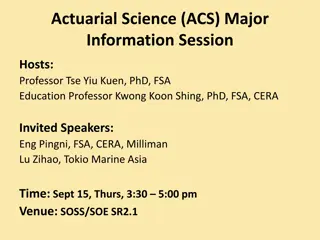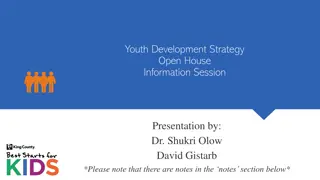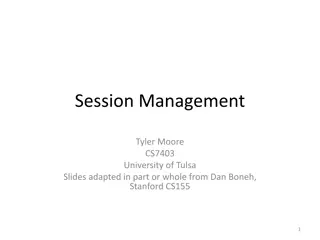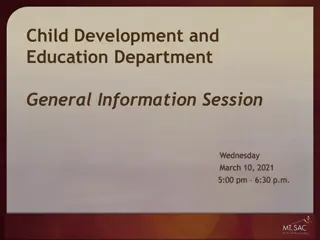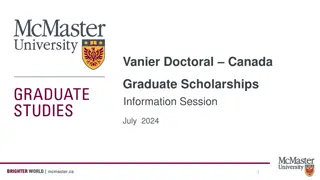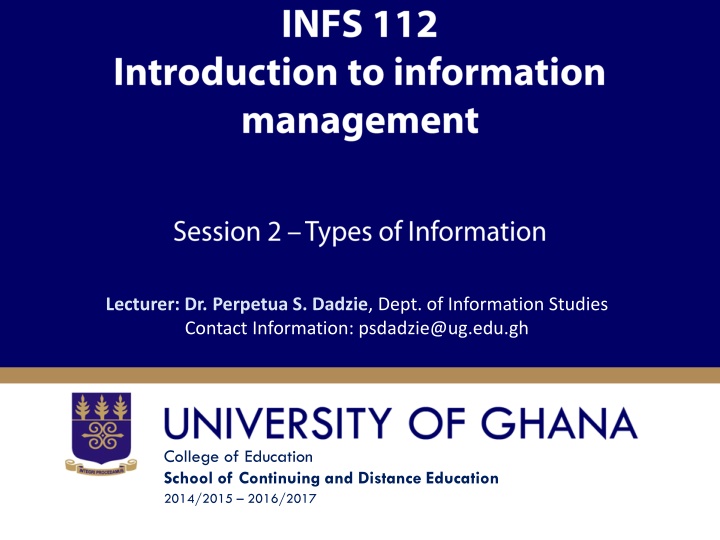
Different Forms of Information - Dr. Perpetua S. Dadzie
Explore the various forms of information, types of information available, and different sources of information in this informative session conducted by Dr. Perpetua S. Dadzie from the Dept. of Information Studies. Enhance your understanding of internal/external information, electronic/hard copy/spoken forms, hard/soft information, and formal/informal sources. Dive into the world of information management with valuable insights shared in this session.
Uploaded on | 1 Views
Download Presentation

Please find below an Image/Link to download the presentation.
The content on the website is provided AS IS for your information and personal use only. It may not be sold, licensed, or shared on other websites without obtaining consent from the author. If you encounter any issues during the download, it is possible that the publisher has removed the file from their server.
You are allowed to download the files provided on this website for personal or commercial use, subject to the condition that they are used lawfully. All files are the property of their respective owners.
The content on the website is provided AS IS for your information and personal use only. It may not be sold, licensed, or shared on other websites without obtaining consent from the author.
E N D
Presentation Transcript
Lecturer: Dr. Perpetua S. Dadzie, Dept. of Information Studies Contact Information: psdadzie@ug.edu.gh College of Education School of Continuing and Distance Education 2014/2015 2016/2017
Session Overview At the end of the session, the student will be able to: Understand the different forms of information which can satisfy your information need Identify the types of information available Identify the different sources of information Slide 2 Dr. Perpetua Dadzie, Dept of Information Studies
Session Outline The key topics to be covered in the session are as follows: Topic One - Forms of Information Topic Two - Types of Information Topic Three Sources of Information Slide 3 Dr. Perpetua Dadzie, Dept of Information Studies
Reading List Elearn (2009). Information and Knowledge Management. Revised Edition. Burlington, MA: Elsevier Ltd. (e-book). Pp. 7 9. Slide 4 Dr. Perpetua Dadzie, Dept of Information Studies
Topic One FORMS OF INFORMATION Slide 5 Dr. Perpetua Dadzie, Dept of Information Studies
Forms of Information Forms of information include: Internal and external information generated inside the organization and information generated outside Electronic, hard copy (paper-based) and spoken Most people use emails to communicate and send out information to colleagues. Others also use conversation with others for information Hard and soft or quantitative and qualitative. Hard information is often derived from large quantities of precise factual data, such as figures (eg no. of users in a library) that lends themselves to statistical interpretation. Slide 6 Dr. Perpetua Dadzie, Dept of Information Studies
Forms of Information (2) Forms of information include: Hard and soft contd. Soft information tends to come from few sources and depends on opinions, feelings, impressions and judgments. Formal and informal - Slide 7 Dr. Perpetua Dadzie, Dept of Information Studies
Forms of Information (2) Examples of formal information sources: Newspapers or electronic newsfeeds Magazine articles Management reports Staff manual Videos of library /archives procedures Slide 8 Dr. Perpetua Dadzie, Dept of Information Studies
Forms of Information (3) Examples of informal information sources: Chat with University librarian Checking out a problem with a colleague Meeting with colleagues at conference, workshops and seminars Informal contact with publishers and suppliers Slide 9 Dr. Perpetua Dadzie, Dept of Information Studies
Forms of Information (4) Differences between formal and informal information Formal Available to more than one person Information captured has been recorded in some way, so can be reused Information used is selected by the recipient eg. You decide which newspaper reports you are going to read Information tends to be static Slide 10 Dr. Perpetua Dadzie, Dept of Information Studies
Forms of Information (5) Differences between formal and informal information Informal May be an interchange between just two people The information is transient not stored or retrievable The information is selected by the provider Information is interactive Slide 11 Dr. Perpetua Dadzie, Dept of Information Studies
Topic Two TYPES OF INFORMATION Slide 12 Dr. Perpetua Dadzie, Dept of Information Studies
Types of Information We need information for very specific purposes e.g. when studying we may need it in order to prepare our notes, to help revise for an exam or just to give us specialist knowledge of a particular aspect of the programme. Types of information listed below will give you a useful framework for thinking about your information needs: Slide 13 Dr. Perpetua Dadzie, Dept of Information Studies
Types of Information (2) news (What's the latest on X? What is happening about Y?) ideas and opinions (What do people think about X?) research results (What does the latest research tell us about X?) theoretical analysis/theory (What are the different theoretical perspectives on Y?) everyday practicalities (e.g. train timetables, telephone numbers, maps) Slide 14 Dr. Perpetua Dadzie, Dept of Information Studies
Types of Information (3) facts and figures (How many cases of X were there last year?) history or background (When did X start? What happened?) people's experience (What is it like to suffer from X? Or to use Y service?) advice or help (Can anyone help me with my work on Y?) technical information (How to mend Z) legal information Slide 15 Dr. Perpetua Dadzie, Dept of Information Studies
Topic Three SOURCES OF INFORMATION Slide 16 Dr. Perpetua Dadzie, Dept of Information Studies
Sources of Information Three main sources of information: Primary, Secondary, Tertiary Primary Information Source provides direct or first hand information about an event, person, object, or work of art. Primary sources are contemporary to what they describe. They are original materials which have not been interpreted, condensed, or evaluated by a second party. Here are some examples of primary information sources. Diaries, Experiments, Poems, Personal correspondences Speeches, Paintings, Interviews, Annual reports of an organization or agency, Patents, Court records Slide 17 Dr. Perpetua Dadzie, Dept of Information Studies
Sources of Information (2) Secondary Information Sources analyses, interprets, or discusses information about a primary information source. Secondary sources are subsequent to what they describe, as they are produced at some point after a primary information source appears. Papers written by students typically contain mostly secondary sources. Here are some examples of secondary information sources. Textbooks, Biographies, Magazine articles, Book reviews, Histories Slide 18 Dr. Perpetua Dadzie, Dept of Information Studies
Sources of Information (3) Tertiary Information Sources lists, compiles, or indexes primary and secondary information sources. These sources are most often used to look up facts or to get a general idea about something. Here are some examples of tertiary information sources. Almanacs, Chronologies, Directories, Manuals, Handbooks, Guidebooks, Indexes, Statistics Slide 19 Dr. Perpetua Dadzie, Dept of Information Studies
Activities Read about sources of information from: http://gethelp.library.upenn.edu/PORT/sources/ List eight information sources that you use on a regular basis Categorise them as formal or informal, internal or external, electronic, hard copy Identify your three most useful sources and analyse why these are the most useful Slide 20 Dr. Perpetua Dadzie, Dept of Information Studies
Video Primary, Secondary ,Tertiary Sources <iframe width="420" height="315" src="https://www.youtube.com/embed/L5DdedR_iF8" frameborder="0" allowfullscreen></iframe> Slide 21 Dr. Perpetua Dadzie, Dept of Information Studies










